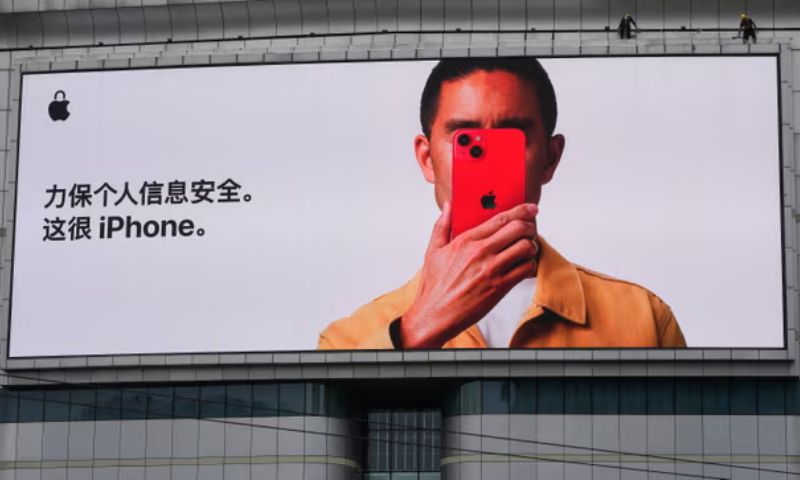BEIJING: Apple, the tech giant with the world’s highest stock market valuation, has experienced a sharp decline in its shares for the second consecutive day following reports of a Chinese government ban on iPhones.
The company’s market valuation has plunged by over 6%, equating to nearly $200 billion, within the past two days, highlighting the significance of the Chinese market to Apple’s global operations.
China is Apple’s third-largest market, accounting for 18% of its total revenue in the previous year. Additionally, China serves as the primary manufacturing hub for Apple products, with Foxconn, its largest supplier, operating extensively in the region.
The Wall Street Journal first reported that Beijing had issued an order prohibiting central government agency officials from bringing iPhones into their offices or using them for work purposes. Subsequently, Bloomberg News suggested that this ban could extend to workers at state-owned companies and government-backed agencies.
These reports come just ahead of the anticipated launch of the iPhone 15, scheduled for September 12. However, there has been no official statement from the Chinese government in response to these claims, leaving uncertainty about the implications for Apple’s operations in the country.
The repercussions of this potential ban are not confined to Apple alone; shares in some of Apple’s key suppliers have also experienced declines. Qualcomm, the world’s largest supplier of smartphone chips, saw its stock drop by more than 7%, while South Korea’s SK Hynix experienced a roughly 4% decline in share prices.
These developments occur within the broader context of escalating tensions between Washington and Beijing. Earlier this year, the United States, alongside Japan and the Netherlands, imposed restrictions on China’s access to certain chip technologies, prompting retaliatory measures from China, including restrictions on the export of critical semiconductor materials.
Furthermore, Beijing has reportedly been preparing a substantial $40 billion investment fund to bolster its domestic chip manufacturing industry. This move reflects China’s aspiration to achieve greater self-reliance in the semiconductor sector, reducing its reliance on foreign suppliers.
In a surprising turn of events, Huawei, a prominent Chinese tech company, unveiled its Mate 60 Pro smartphone during US Commerce Secretary Gina Raimondo’s recent visit to Beijing. The device features a new 5G Kirin 9000s processor, developed in collaboration with China’s largest contract chipmaker, SMIC. Analysts at TechInsights noted the significant progress in China’s semiconductor industry represented by this development.
The escalating tension between the US and China has prompted calls from US Congressman Mike Gallagher for the Commerce Department to further restrict exports to Huawei and SMIC. These developments underscore the complex interplay of geopolitics and the tech industry, with significant implications for global markets and supply chains.

























